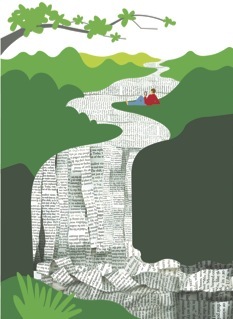Chris Anderson, in his NY Times bestseller “Free: The Future of a Radical Price,” asks Stewart Brand about his oft-quoted maxim, “. . . information wants to be free . . .” and its in Brand’s answer that we find the reason for the capital “F” in Anderson’s Free.
Brand (founder of Whole Earth Catalogue) explains his quote is often taken out of context and that the verb phrase “wants to” was purposeful. Brand did not say “information SHOULD be free” or “information MUST be free” or “information WILL be free.” Brand is almost anthropomorphising “information,” implying that it has a “mind of its own.” Anderson, in his well-researched book, gives us rhyme and reason for the downward spiral towards Free in the digital age. He gives us many maxims and examples of how individuals and corporations alike have benefitted from a new Free economy, but like Brand, he isn’t saying the bits marketplace SHOULD be this way or that Free-dom will replace capitalism. (Or god forbid that it spread like socialism which is what Bill Gates implied about 10 years ago.)
Let’s examine Brand’s quote in its entirety, noting that it was first uttered at a 1984 conference designed to determine whether the “hacker culture” would go mainstream:
On the one hand information wants to be expensive, because it’s so valuable. The right information in the right place just changes your life. On the other hand, information wants to be free, because the cost of getting it out is getting lower and lower all the time. So you have these two fighting against each other.
Anderson’s book makes an excellent case for how information is like water seeking lower ground, how the traditional brick and mortar or atom-based economy defines value by money, money, money and how the digital/bits economy defines value by attention (traffic) and reputation (links). But, many of Anderson’s examples read like digital age “bait and switch” marketing or standard cross-subsidy economics:
- Prince’s Plant Earth CD is give-away in London’s Daily Mail drives huge live concert ticket sales
- FlatWorld Knowledge breaks up expensive biology textbooks into manageable chunks (some free, some at nominal price) as digital books and mp3s. The used book market goes away, which leaves all the future revenue for the company
- Controlinveste gives away silverware in the daily Portugal newspaper. Circulation increases.
- PracticeFusion gives away free medical records software. Then, they sell patient’s data to researchers.
- Google makes GOOG411 free. They gather valuable data (accents, localities) for a future mobile voice search engine.
Anderson makes an excellent case throughout the book that Free is here to stay. His message seems to be that to compete today, your marketeers have to have some of these tricks up their sleeves. Afterall, he argues, when a commodity (information access via broadband and computer processing power) becomes so cheap as not to be measurable, you have to wave the white flag. Of particular benefit, is Chapter 8, De-Monetization, where he deconstructs Google’s economic model: technology grows increasingly less expensive over time, so giving away free disk space for emails may cost more today, but tomorrow will decrease dramatically, to the point of even cheaper than Free (!). So, Google can afford to give away email because it only increases the audience for their 20 billion dollar advertising business.
So as Google prepares to take over the world, the rest of the Web’s businesses are left with the Freemium model. Anderson claims that 80% of internet businesses work this way: Five percent of the users pay for a premium product after getting hooked on the free version that the other 95% are still enjoying for free. At the end of the book, Anderson gives examples of businesses based on these models and he goes further to poke holes in fourteen arguments about why free won’t work.
Anderson doesn’t summarize with any concrete answers. You certainly can’t use this book as your bible for how to survive in today’s freemium market. The book does, however, prompt gazillions of questions. It makes me wonder if the hacker culture that Stewart Brand (. . .”information wants to be free . . .”) was exploring in the eighties is REALLY here. It also made me question if I’m like one of those “scribe lovers” in Shirkey’s “Here Comes Everybody” who is just bemoaning a culture that will, certainly, be lost. To conclude, I’m reminded that Brand’s quote BEGAN with “. . .information wants to be expensive because it’s so valuable.” and the linking sentence: “The right information in the right place changes your life.” Somehow, those concepts get lost. But then again, that wasn’t the point of the book, was it?
Should you read it? If you’re starting an internet business, reading at least the last few chapters of “Free” is highly recommended. If you weren’t born into what Anderson calls the Google Generation, this book is required reading, period. Do me a favor: try to get this book for Free! You can receive the abridged audiobook at www.hyperionbooks.com/free. The free ebook versions are no long er available. They were on the free market only this past summer as promotional fodder. It worked. Anderson’s book climbed to #12 on the nonfiction NY Times bestseller list.
Related Reading (thank you Lloyd and Andrew)
Malcom Gladwell’s Review in the New Yorker
Virginia Quarterly Review Accuses Anderson of Plagiarizing from Wikipedia
Newsweek’s “The Future Won’t be Free”
Billboard’s The Future Of Digital Content: Not All Will Be Free



Thanks for sharing your digest of Chris Anderson’s new book and all these additional resources to understand the potential Free economy in the digital era. Also, great job of delivering a very compelling and delicious presentation of the “Predictably Irrational” theory and your book report with a jar of candies, well done!
Thanks for commenting Ruby!